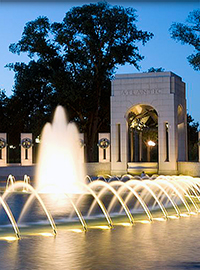| The Ghosts of World War II |
 |
|
By Victor Davis Hanson
Thursday, September 05 2019 |
World War II ended 74 years ago. But even in the 21st century, the lasting effects endure, both psychological and material. After all, the war took more than 60 million lives, redrew the map of Europe and ended with the Soviet Union and the United States locked in a Cold War of nuclear superpowers. Japan and South Korea should logically remain natural allies. Both are booming capitalist constitutional states. Decades ago both nations emerged from devastating wars. And in pacifist fashion they vowed never to suffer such mass carnage again. Both nations are staunch allies of the United States. They are likewise similarly suspicious of their neighbor, aggressive communist China, which threatens their economies and security. Yet Tokyo and Seoul are now more adversaries than democratic allies, and they are locked in a bitter fight. In their acrimony over trade and past war reparations, neither can forget World War II. South Koreans continue to press for more reparations to atone for the horrific treatment of the Korean Peninsula by Japanese occupiers and imperialists. Imperial Japan stripped Korea's natural resources and exported thousands of Korean women to war zones to be raped by Japanese troops. The wealthier that South Korea becomes, the more an ascendant Seoul begins to rival — and worry — Tokyo. And the more distant World War II becomes, the more Japan and South Korea relive their bitter shared wartime past. The United States has had difficulty forming a Pacific alliance of containment against a bellicose China. Australia, the Philippines and Southeast Asian nations fear Chinese aggression. But they also share bitter memories of merciless Japanese imperialism that killed as many as 15 million Chinese — the vast majority of them civilians. In their minds, our allies know China is the chief threat. But in their hearts, even now they can't quite forget how their ally Japan once committed genocide throughout the region. NATO was designed to avoid another European war and the constant threat bullying from Germany and Russia. NATO's creed, first, was that the United States should stay engaged in Europe and never again allow it to commit collective suicide. Second, America was to keep Russia out of Western Europe as it did in at the end of World War II. Third, the alliance must keep Germany "down" so it would never start another European war. That third element of the original NATO mission is often laughed at as entirely irrelevant today. But is it? Germany now dominates the European Union. Its banks squeeze Southern European countries for overdue loan payments. Berlin pressures Eastern Europe — whose leaders grew up with lectures about the nightmares of Nazi Germany — to follow Berlin's disastrous open borders plan. That laxity has resulted in more than a million migrants flocking into the EU from the Middle East and North Africa. Berlin also tried to hold the United Kingdom hostage to prevent Brexit — the verdict of the British people, a majority of whom voted to leave the EU. Less than half of today's German population has a favorable view of America, the country whose troops and nuclear umbrella still keep a virtually unarmed Germany secure. A clairvoyant in 1945 might have warned both Europe and the United States that a "Fourth Reich" financial powerhouse would someday dominate Europe. In addition, Germany still has an existential fear of Russia. After all, more than 3 million German soldiers perished on the Eastern Front in World War II. Millions of German-speakers were ethnically cleansed from postwar Russia and Eastern Europe by the Russian Army. No wonder that German Chancellor Angela Merkel seeks close ties with Russian strongman Vladimir Putin's autocratic Russia. As was true during the end of World War II and the beginning of the Cold War, Germany once again has little if any ability to ward off Russian aggression, whether conventional or nuclear, and knows it. Finally, a recent poll of Americans reveals a veritable abyss between younger and older Americans. Today's millennials, children of the postwar baby boomers, grew up in the affluence of the late 20th and early 21st centuries. They claim that they will be far less likely to marry, to value religion or to feel patriotic. In contrast, those who were once children during World War II, or who had parents and grandparents who fought in the war, have a far more realistic appraisal of human nature and the need to find security, stability and transcendence in a dangerous world. One way of keeping sane and safe during and after such a global catastrophe was to marry and raise a family, to believe in God, and to appreciate the unique morality and strength of a victorious United States. World War II ended in 1945. And then again, it really did not. Victor Davis Hanson is a classicist and historian at the Hoover Institution, Stanford University, and the author of the soon-to-be released "The Second World Wars: How the First Global Conflict Was Fought and Won," to appear in October from Basic Books. You can reach him by e-mailing authorvdh[at]gmail.com. |
Related Articles : |
























